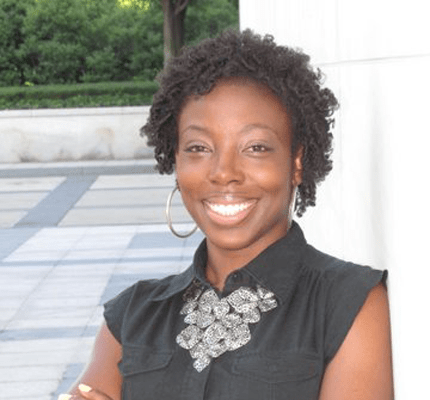
5 Questions With…
In this feature, we offer a closer look at some of your communication colleagues via five questions related to their research, the communication discipline and higher education, and their experiences with NCA.
Morgan Smalls is a fourth-year doctoral student in the Department of Communication, Culture and Media Studies (CCMS) at Howard University. Her areas of research lie at the intersection of Africana, women and gender, and media studies. Specifically, she uses popular culture as an entryway into larger conversations about race, class, and gender. Additionally, she is the internship coordinator in the Department of Strategic, Legal and Management Communication, a member of Howard University’s Graduate Student Council, Professional Development Chair of the CCMS Graduate Student Organization, and Secretary of NCA’s Black Caucus.
- What is your current research focus, and can you share something interesting or exciting you’ve come across recently?
I am interested in the portrayal of Black women in media and social media, and the counter narratives that are created to combat sexism, racism, and the lack of representation or misrepresentation in traditional media, such as television and film. Through my research, I have found that Black women participate in social television and use it as a safe space to discuss topics relevant to their womanhood and experience. I find it interesting to look at social television and see how Black women operate in that space, as it is an understudied research area.
- Can you tell us about one of your most inspiring mentors in the communication discipline, and how they have influenced your journey thus far?
As a first-generation college student, it is very difficult to choose one person, as my academic journey has been fostered by several mentors. I attended Columbia College for undergrad, where Dr. Jason Munsell encouraged me to present at conferences. Through that, I was introduced to the larger body of communication scholars. While at UNC-Charlotte earning my masters, Dr. Jillian Tullis served as my thesis advisor and provided a lot of knowledge about qualitative data collection and analysis. At Howard University, Dr. Tia Tyree is my dissertation advisor and has been very supportive of my academic and professional pursuits. I love Dr. Tyree’s organized working style and the research she conducts, so it has been invaluable to see how she takes a topic from idea to publication. With a slated graduation date of May 2019, all my former and current professors, colleagues, and classmates are a part of my village.
- As the NCA Black Caucus celebrates its 50th anniversary this year, can you talk about the significance of this, and your role within the caucus and what it means to you personally and professionally?
The 50th anniversary of the NCA Black Caucus is a once-in-a-lifetime moment. As Secretary of the Black Caucus, I am honored and humbled to be a part of it. The 50th anniversary is a time to reflect upon, honor, and celebrate those who paved the way for our organization. It is also a time to discuss how the current members can continue to move the agenda of the caucus forward and continue to make strides in our activism, research, professional development, teaching, and service. Personally, the Black Caucus has been a home and safe space in which I can discuss my research, gain mentors, meet colleagues who conduct similar research, meet sparring partners who challenge my ideas, and make friends and professional connections. I encourage everyone to come to our panels, business meetings, and Meet and Greet at the Annual Convention in November.
- What advice do you have for fellow graduate students in the communication discipline based on your experiences?
A Ph.D. program can be exhausting, so make sure you eat well, get adequate rest, and find ways to destress. Self-care is important, so prioritize and plan ahead to lessen stress. Become extremely familiar with the research of the faculty in your department, and seek ways to work with them on projects outside of class. Get to know the other students in your cohort and academic program as well as outside of your department, as they will serve as one of the best forms of advice and support. The process of earning a Ph.D. is a marathon, not a sprint. Begin with the end in mind, pace yourself, and enjoy the beauty of being in an environment with people who also enjoy learning.
- What are some of your professional goals for the next five years?
My overarching goal is to make a positive impact on the communication field with my research, teaching, and service. Below are a few ways I plan to execute that:
1. Write and defend my dissertation with distinction.
2. Secure a tenure-track faculty position.
3. Publish and collaborate with other scholars
4. Network and present at conferences, workshops, and guest lectures.
6. Pay it forward by mentoring other students.
7. Continue to be an active member of NCA and learn more about the administrative side of academia.
Bonus: Will you be attending the Annual Convention this year, and, if so, what are you most looking forward to? Are you presenting?
Of course! I have not missed one since I started attending. One of my favorite parts is attending panels and learning about the research that others in the field are doing. I am also looking forward to all the activities we have in association with the 50th anniversary of the NCA Black Caucus, as well as the Black Caucus Business Meeting, and the Black Caucus and the African American Communication and Culture Division's Meet and Greet. I am also presenting with colleagues on three panels on Friday and Saturday. I look forward to seeing you all there.

